- Home
- Lauren Willig
The Passion of the Purple Plumeria Page 14
The Passion of the Purple Plumeria Read online
Page 14
That sounded like Miss Gwen all right. “Got it,” I said.
“Plumeria is the heroine of the novel,” said Mrs. Selwick-Alderly helpfully. “Rather an unusual heroine too.”
“If Miss Gwen wrote her, she must be,” I murmured. “But what does this have to do with the lost jewels of Berar?”
“I don’t know,” said Mrs. Selwick-Alderly, “but I gather that it was the runaway bestseller of 1806. It wasn’t eclipsed until Byron came out with Childe Harold in 1812. That,” she added, “is a first edition.”
Jeremy, who had been surreptitiously checking his phone, looked up with sudden interest.
I hastily put it down again, well away from the tea.
Mrs. Selwick-Alderly smiled. “Don’t worry, it’s not that valuable. Literary scholars haven’t been kind to our Miss Meadows.”
“No, I can’t imagine they would be,” I said, turning over the small morocco volume in my hands. Its spine proclaimed that it was Volume I of V.
“There’s a much grander copy at the Hall,” said Mrs. Selwick-Alderly, “or at least there was when I was young. It belonged to Colonel Reid’s youngest daughter, who married Richard’s son. It’s the size of a dictionary, though, all five volumes in one. You’ll do better with this one.”
“Thank you?” I said. I still wasn’t quite sure what I was meant to do with it.
“Many years ago,” she said, “I was told that the clue was in the book. I wasn’t able to figure it out, but perhaps the three of you together will. Three minds, after all, are better than one.”
Not if two of them were occupied with plans for mutual destruction. But I didn’t say that. Instead, I thanked her nicely and slid the book into my capacious shoulder bag.
Colin glanced at his watch. “We should be going if we want to catch the early train back.”
I knew that really translated to we should be going before I kill Jeremy.
Mrs. Selwick-Alderly was always her most dangerous when she was her most serene. “No need,” she said airily. If she hadn’t been a dignified woman of over eighty years, I would have called her expression impish. “Jeremy will drive you up.”
This was apparently news to Jeremy, too.
“Well, you can’t all look for the jewels at the Hall if you aren’t all up there together.” As we all sat stunned, she lifted the teapot. “More tea?”
Ten months ago, she had pulled a similar move to get a reluctant Colin to take me up to the Hall with him. At the time, I had thought it was great. This time, I was on the other side of it. The teeth-gnashing side of it.
It didn’t help that Jeremy’s car was a convertible clearly designed for two. I offered to sit in the back, since my legs were shorter than Colin’s. I was voted down. I spent the drive back down to Sussex with my hair blowing across my face like Cousin It, Colin in the backseat behind me, legs folded to his chin, sending off waves of annoyance so palpable that they probably counted as toxic waste.
It felt like a very long drive.
No one spoke. We couldn’t think of anything neutral to say. Miss Gwen’s book burned in my bag against my leg. I was itching to take it out and start flipping through it—maybe someone had hidden a note in there? Nancy Drew was always finding things under the lining of old books—but (a) Jeremy was right next to me, (b) Jeremy wasn’t putting the damned top up and I didn’t want to risk it blowing away, and (c) Jeremy was right next to me. Collaboration went only so far.
Windblown and sullen, we all fished up in the front hall of Selwick Hall, kicking our feet against the hall rug and not looking at one another. The Hall felt different with a houseguest, especially an unwanted one. For the past few months, this had been, as odd as it was, my home. Colin’s home, of course, not mine, but this was where I wandered around in my pajamas with my hair unwashed and a toothbrush sticking out of my mouth. I knew how to navigate the kitchen with the light off to get to my favorite coffee mug, and I’d internalized the trick of not stepping on the squeaky step on the front stairs.
With the introduction of Jeremy, who had grown up in and out of this house, the one-third owner, I was suddenly a guest again.
I didn’t like it.
Not that I had any right to complain. I was leaving in less than two months, after all. I picked unhappily at the corner of a nail. We still hadn’t really talked about that, Colin and I, and I didn’t think we were going to with Jeremy in the house. It was like having the Ghost of Christmas Future, the grim, funereal one, brooding over you—that is, if the Ghost of Christmas Future wore expensive linen suits.
Jeremy had an overnight case with him. His grandmother, he said, had invited him to stay for a few days. I believed him. It seemed like the sort of ploy Mrs. Selwick-Alderly would concoct. She had probably already cooked up her little plot to send him up to the Hall so the boys could play together and make up.
Colin obviously didn’t believe him but wasn’t going to say anything. So he didn’t say anything at all.
The silence stretched on. And on. It was so quiet that I could hear the drone of bees in the overgrown roses in the garden and the tick of the grandfather clock on the landing.
Someone had to take charge. “You.” I pointed at Colin. “Search the tower. I know you’ve done it before, but someone has to do it again.”
“Why not me?” asked Jeremy.
“I wouldn’t want you to break a nail,” said Colin.
I intervened before it could get nasty. “We don’t need both of you in the tower. Jeremy, you can handle nineteenth-century handwriting, right?”
Jeremy looked like a cat who had been offered the generic brand instead of Fancy Feast. His nose twitched with disdain. “Naturally.”
“Good. There’s a whole stack of Lady Henrietta’s letters I haven’t gone through yet. There might be something in there.”
I hated having anyone but me going through those, but unlike some people, I knew Jeremy had zero interest in ripping off my dissertation research. He couldn’t care less which spy had done what when unless it led him to the jewels. Besides, like the rest of the family, he already knew the identity of the Pink Carnation.
It gave me a rather icky feeling that he was family, but in this case, it came in handy.
Not that I wouldn’t go through the letters myself to make sure that he wasn’t hiding anything, but we could cover more ground if we all divvied up.
Jeremy gave me a look. “And what will you be doing?”
I’d saved the short straw for myself. “Me? I’ll be reading through all five volumes of The Convent of Orsino. If either of you want to trade, just let me know.”
My boyfriend dropped a kiss on the top of my head. “Have fun with that,” he said.
“Better you than me,” agreed Jeremy.
Lovely. They were getting along better already. And I wanted to kick both of them.
“Dinner at seven,” I said. “And one of you had better be doing the cooking.”
Chapter 10
Sir Magnifico woke under the gnarled branches of a squat and stunted oak tree. Where was the perfumed pavilion, the silken pillows? The only mattress beneath him was the moss, sere and scratchy. He lay in a barren and blasted heath, open to the elements, the only sign of habitation the stark shape of a dark tower in the distance.
The sky lowered, as if with impending rain—or impending doom.
—From The Convent of Orsino by A Lady
William woke in a room he didn’t recognize.
It was nearly dawn outside, the sky that peculiar yellow-gray that precedes the sunrise, the trees outside blurry and dim through the uneven glass of the windows. A woman lay in the bed beside him, curled on one side. Her head was buried in the crook of one arm. He couldn’t see her face, just the crook of her arm, the curve of her hip. Her hair had been tightly pulled back, braided and coiled around her head. Dark wisps curled like question marks against the nape of her neck.
Who in the blazes was she, and why were they in bed together? He didn’t conduct
casual affairs, not anymore. He especially didn’t conduct casual affairs with women wearing all their clothes and lying on top of the covers.
William tried to move, to ease the covers off, but a sharp pain in his side made him subside against the pillows. His head ached like the very devil.
Memory flickered and wavered like a candle flame, brigands in the road, a white-robed houri in a Persian pleasure garden, Kat’s reddened hands, the flash of a slim silver blade in a lady’s hand.
He needed to get somewhere, to do something. One of his children was in trouble—Lizzy, little Lizzy. Lizzy had run away.
It came back to him in a rush, with a sick, sinking feeling at the pit of his stomach. Lizzy was in trouble and he was meant to be finding her. Only . . . only . . . what in the hell was he doing here?
Gasping against the pain, he struggled to sit, reaching for the candle on the nightstand. His groping hand knocked against the pewter base, sending it tumbling to the ground. It landed on the uncarpeted floor with a horrible, hollow clang.
The woman beside him lurched upright, instantly awake and on the alert. She reminded William of a tigress in the jungle, sniffing the air for danger, head turning this way, then that. The coronet of braids on top of her head, loosened by sleep, trembled with the movement.
“What’s that?” she demanded.
That clipped voice was familiar. William had heard it before. He tried to sit, but the movement made him wince.
“Stop that!” she said. “You’ll hurt yourself.”
Meadows. Miss Gwendolyn Meadows. You may call meMiss Gwen. . . .
“Gwen,” he said slowly. It came out as a croak, like a frog. It didn’t sound like him in the slightest.
Gwendolyn Meadows pulled her dress up around her shoulders. “Well, I suppose given that I’ve seen you with your clothes off, I shouldn’t quibble at your use of my name.” She must have loosened the lacings to sleep; the purple traveling costume gaped at the neck, revealing a glimpse of a surprisingly frivolous shift embroidered with purple flowers. She gave her dress a tug and the flowers disappeared. “At least you know me this time. A few hours ago you were still calling me Maria.”
He blinked at her, more confused than he had ever been in his life. His mouth felt like someone had crammed it with cotton wool. As for his head—his head didn’t bear thinking of. Had someone been pounding his forehead with a mallet?
As muddled as he was, it took a few moments for the impact of her words to kick in. Given that I’ve seen you with your clothes off . . .
He could see his calf poking out from under the sheet. His bare calf. His shoulders were bare too. He could feel every lump in the mattress against his bare back. Breeches? Was he wearing breeches? He seemed to be. Not that they covered much, and the lacings at the top were most definitely undone.
William looked at his companion with panic in his eyes. “I didn’t—we didn’t—”
Gwen made a face at him. “Calm yourself, Colonel. You were the perfect gentleman.” She slid off the edge of the bed, the movement of her body tugging the covers with her. William made a feeble grab for them before the whole of his body could be exposed to the world. “You didn’t have the energy to be anything else.”
That he could believe. He had never felt so weak in his life, not even after a bout of dysentery his first summer in India, his body fever racked and convulsing, with a coolie ineffectually pulling a slow-moving punkah above.
But this wasn’t India; this was England. He had come back to England. For Kat. And Lizzy.
“Bath,” he said, wiggling back against the pillow. The sheet slipped, revealing a neat basket weave of bandages across his chest. “We have to get to Bath.”
“Sit!” barked Gwen. “You’re not getting anywhere by tearing your stitches open.”
Stitches? He had had stitches?
He remembered none of this. William subsided against the pillow, baffled and infuriated by his own weakness, his own patchy memory. The dimness of the room didn’t help. He hated not being able to see properly, unsure whether it was his eyes or the maddening half-light of dawn.
Gwen Meadows scooped up the candle he had knocked over, lighting it from the embers of the fire. A small flame appeared, shielded by her hand. The room was small and close, with the musty smell of the sickroom.
“How long have I been like this?” It hurt to talk. His throat felt cracked and dry.
“Drink this,” said Gwen Meadows, and poured something from the jug on the bedside table into a battered pewter goblet.
He tried to take it from her, but his hands betrayed him, shaking so that the liquid sloshed over the sides, wetting the sheet that covered him. He felt shamed, shamed many times over.
Brushing aside his ineffectual efforts, Gwen held the cup neatly to his lips, tipping it so he could drink. It was water, slightly stale from sitting in the jug, but liquid nonetheless. He drank thirstily, the liquid trickling down his chin.
“You needed that, didn’t you?” said Gwen, with some satisfaction, blotting the damp from his chin. It was maddening being so helpless. “You wouldn’t believe the time I’ve had getting anything into you.”
Yes, he vaguely remembered that. He remembered someone spooning broth into his mouth, scolding and cajoling by turns. But he also remembered a goddess holding out a chalice in both hands, a goddess in an enchanted garden, her dark hair unbound, offering him mead and honey. Reality and dream warped and melded.
“I had the strangest dreams,” he said slowly.
Gwen busied herself with the miscellany on the bedside table. “I shouldn’t be surprised,” she said. “You were raving like anything. Most of it in foreign tongues, although I believe there were one or two sea shanties in there.”
William winced. “Not the one about—”
“Yes,” said Gwen. “That one.”
William didn’t know what to say. “I’m sorry?”
“Don’t be,” she said serenely. “It was most instructive. Especially the bit about the sailor’s rest, sa-ha, sa-ha.”
William could feel his cheeks burning with something other than fever. The sailor’s rest was upon his lady’s breast. They were very buxom breasts, an attribute that was described in detail. The song became even more explicit from there. Sex-starved men on a long voyage were apt to become more than a little imaginative.
William tried very hard not to look at his companion’s breasts, even though they were directly in his line of vision.
He raised his eyes back to her face. “I spent some time on a ship in my youth,” he ventured, by way of apology. “Amazing the things that cling in one’s head.”
“Amazing,” Gwen agreed drily. “Don’t tell me you didn’t have songs just as vulgar in your mess in Madras.”
He might have tried to make the argument, but there were fairly good odds that she’d heard some of them while he was out cold.
He scratched the stubble on his chin. It was longer than it ought to be, the grizzled hair halfway to a beard and itchy to boot.
“How long was I out?” he asked again.
She seated herself on the edge of the bed, carefully, so that the mattress wouldn’t sag and jar him. “Four days.”
“Four days! I must—”
“Don’t even think of it,” she said. She loomed over him, pinning him neatly into place, one arm on either side of his shoulders. “I didn’t patch you up just to let you make yourself ill again.”
Again he felt himself falling into that odd gap between dream and memory. It was Gwen leaning over him, but not Gwen, a woman with long black hair that streamed around her shoulders, long black hair and full red lips, stroking hands and twisting bodies.
Even the memory had the power to arouse him. He was grateful for the protection of the dim light.
He blinked up at her, fighting his way back to reality. “It seems I owe you my thanks,” he said slowly.
“Yes,” she said, “you do. Although if I’d been faster on my feet, you might not ha
ve been skewered in the first place.”
“We were waylaid.” William’s head ached abominably. He rubbed it with the heel of one hand.
She patted his hand. “Yes, by a trio of brigands with the temerity to draw knives on you.”
“You beat them off.” He was beginning to remember now, the men, the knives, Miss Meadows and her parasol that turned into a sword.
“You weren’t doing too badly yourself,” she said graciously. “You were at a disadvantage, bare hands against blades.”
Her words echoed strangely, slurring together in his head. He could feel himself slipping again into sleep. He felt a cool hand against his forehead, his cheek, easing him down again against the pillows, and one word, “Rest.”
This time, he slept without dreams.
When he woke, it was full dark again. He was alone in the bed. In the hearth, the fire had burned down, and the temperature in the room was noticeably colder than before, nipping at his nose and bare shoulders. Gwen sat at the table by the window, scribbling busily in a notebook, a shawl draped over the shoulders of her purple dress. There were four candles lit, all guttering merrily away, more than half burnt down, and the remains of a hunk of bread, cheese, and cold meats on a round platter beside her.
William blinked, as if he could will the sky outside the windows to change color. It had been dawn, not even dawn, the last time he’d woken. He couldn’t have slept through the whole day!
Apparently, he had. Another day lost. Another day . . .
He heaved himself up. This time, his body obeyed. He still felt as though someone had gone after him with a mallet, but the wretched fuzziness was gone, and his limbs, although weak, obeyed his commands.
“You’re awake!” said Gwen, closing her notebook over her pencil and hurrying over to him. She set the back of her hand against his forehead, paused a moment, and then nodded. “No fever.”
“Did you put something in the water?” he asked accusingly.
“No,” she said.
William raised his brows. They were one of the few parts of his body that didn’t hurt.
“I would have,” Gwen said frankly, “but I ran out. You needed the sleep; that’s all. Since you’re awake . . .”

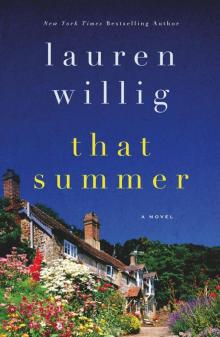 That Summer
That Summer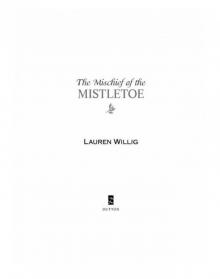 The Mischief of the Mistletoe
The Mischief of the Mistletoe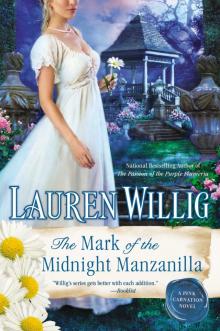 The Mark of the Midnight Manzanilla
The Mark of the Midnight Manzanilla The Other Daughter
The Other Daughter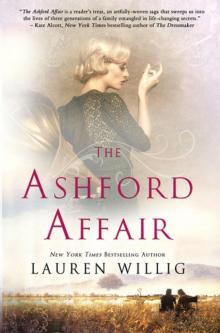 The Ashford Affair
The Ashford Affair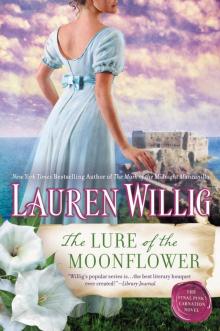 The Lure of the Moonflower
The Lure of the Moonflower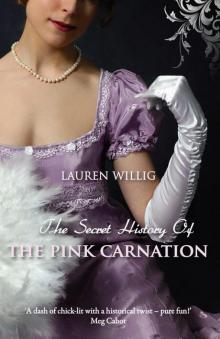 The Secret History of the Pink Carnation
The Secret History of the Pink Carnation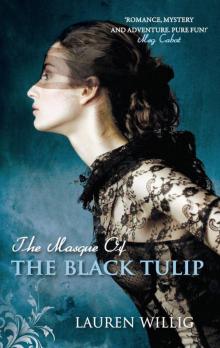 The Masque of the Black Tulip
The Masque of the Black Tulip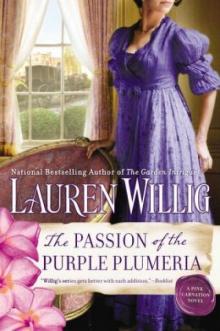 The Passion of the Purple Plumeria
The Passion of the Purple Plumeria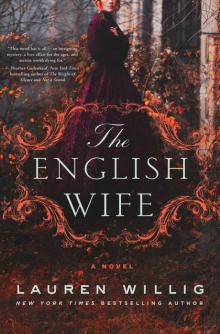 The English Wife
The English Wife The Garden Intrigue
The Garden Intrigue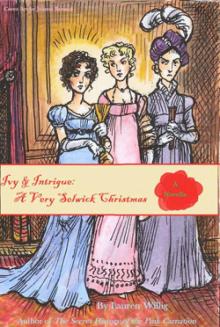 Ivy and Intrigue: A Very Selwick Christmas
Ivy and Intrigue: A Very Selwick Christmas The Orchid Affair
The Orchid Affair The Summer Country
The Summer Country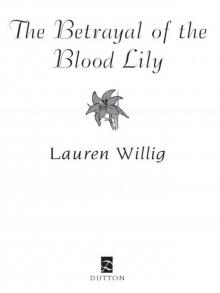 The Betrayal of the Blood Lily
The Betrayal of the Blood Lily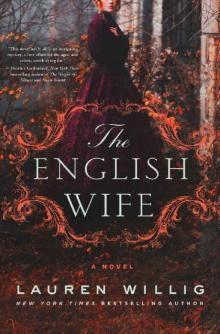 The English Wife: A Novel
The English Wife: A Novel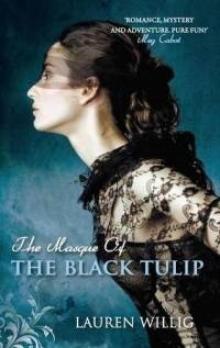 Masque of the Black Tulip pc-2
Masque of the Black Tulip pc-2 The Secret History of the Pink Carnation pc-1
The Secret History of the Pink Carnation pc-1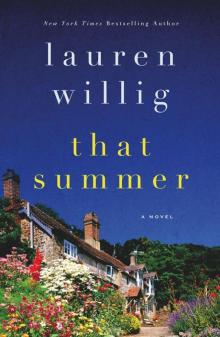 That Summer: A Novel
That Summer: A Novel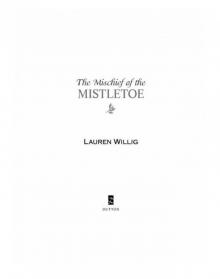 The Mischief of the Mistletoe: A Pink Carnation Christmas
The Mischief of the Mistletoe: A Pink Carnation Christmas